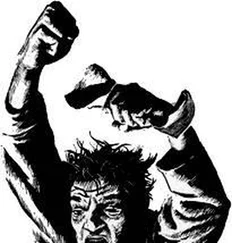“But there's one thing that makes me sure. What do we know about Ragnar?” He looked round the table. “Right, he's a bastard.”
“Church-despoiler,” agreed Archbishop Wulfhere from the end of the table. “Ravisher of nuns. Thief of the brides of Christ. Assuredly his sins shall find him out.”
“I dare say,” agreed Cuthred. “One thing I have heard about him is this, and I've only heard it about him, not all the other Church-despoilers and ravishers there are in the world. Ragnar is very big on information. He's like me. He's good at getting people to talk. The way he does it, I hear, is this”—A note of professional interest crept into the captain's voice.—“If he catches someone, first thing he does—no talk, no argument—is gouge one eye out. Then he still doesn't talk, he reaches round and gets the man's head ready for the next one. If the man thinks of something Ragnar really wants to know while he's getting ready, all right, he's in business. If he doesn't, well, too bad. They say Ragnar wastes a lot of people, but then churls aren't worth a lot on the block. They say he reckons it saves him a lot of time and breath.”
“And our prisoner has told you this is his view too?” It was one of the black monks who spoke, his voice dripping condescension. “In the course of a friendly discussion on professional matters?”
“No.” Cuthred took another pull at his ale. “But I looked at his nails. All clipped short. Except the right thumbnail. It's been grown an inch long. Hard as steel. I got it here.” He tossed a bloody claw onto the table.
“So it's Ragnar,” said King Ella in the silence. “So what do we do with him?”
The warriors exchanged puzzled looks. “Like you mean beheading's too good for him?” ventured Cuthred. “We should hang him instead?”
“Or something worse?” put in one of the other nobles. “Like a runaway slave or something? Maybe the monks—what was that story about Holy Saint… Saint…? The one with the gridiron, or…” His imagination ran out; he fell into silence.
“I have another idea,” said Ella. “We could let him go.”
Consternation faced him. The king leaned forward from his high seat, his sharp, mobile face and keen eyes passing to each man in turn.
“Think. Why am I king? I'm king because Osbert”—the forbidden name sent a visible shudder through the listening men, and called an answering twinge from the lacerated back of the servant who stood listening behind Wulfgar's stool—“because Osbert could not defend this kingdom against the Viking raiders. He just did what we'd always done. Told everyone to keep a lookout and organize their own defense. So we had ten shiploads land on a town and do what they liked while the other towns and parishes pulled the blankets over their heads and thanked God it wasn't them. What did I do? You know what I did. I pulled everyone back except the lookout stations, I organized the rider teams, I set up the mounted levies at the vital places. Now, they come down on us, we have a chance of coming down on them before they get too far, of teaching them a lesson. New ideas.
“I think we need another new idea here. We can let him go. We can do a deal with him. He stays away from Northumbria, he gives us hostages, we treat him as an honored guest till the hostages come, we send him off with a pile of presents. Doesn't cost us too much. Could save us a lot. By the time he's exchanged he'll have got over Cuthred's conversation with him. All part of the game. What do you say?”
The warriors looked at each other, eyebrows rising, heads shaking in surprise.
“Might work,” muttered Cuthred.
Wulfgar cleared his throat to speak, a look of displeasure crossing his reddened face. He was cut off by a voice from the black monks at the end of the table.
“You may not do that, my lord.”
“May not?”
“Must not. You have other duties than those in this world. The archbishop, our reverend father and former brother, has reminded us of the foul deeds done by this Ragnar against Christ's Church. Deeds done against us as men and Christians—those we are commanded to forgive. But deeds done against Holy Church—those we must avenge with all our heart and all our strength. How many churches has this Ragnar burned? How many Christian men and women carried off to sell to the pagans and worse, to the followers of Mohammed? How many precious relics destroyed? And the gifts of the faithful stolen?
“It would be a sin against your soul to forgive these deeds. It would imperil the salvation of every man around this table. No, King, give him to us. Let us show you what we have made for you, for those who molest Mother Church. And when the news of that reaches back to the pagans, the robbers from the sea, let them know that Mother Church's arm is as heavy as her mercy is long. Let us give him to the serpent-pit. Let us make men talk of the worm-yard of King Ella.”
The king hesitated, fatally. Before he could speak, the sharp agreement of the other monks and of the archbishop was echoed by the rumble of surprise, curiosity, approval from his warriors.
“I have never seen a man given to the worms,” said Wulfgar, his face beaming with pleasure. “It is what every Viking in the world deserves. And so I shall say when I return to my own king, and I shall praise the wisdom and the cunning of King Ella.”
The black monk who had spoken rose to his feet: Erkenbert the dreaded archdeacon. “The worms are ready. Have the prisoner taken to them. And let all attend—councillors, warriors, servants—to see the wrake and the vengeance of King Ella and Mother Church.”
The council rose, Ella among them, his face still clouded by doubt, but swept along by the agreement of his men. The nobles began to jostle out, calling already for their servants, friends, wives, women to join them, to see the new thing. Shef, turning to follow his stepfather, looked back at the last moment to see the black monks still clustered in a little knot at the end of the table.
“Why did you say that?” muttered Archbishop Wulfhere to his archdeacon. “We could pay a toll to the Vikings and still save our immortal souls. Why did you force the king to send this Ragnar to the serpents?”
The monk reached in his pouch and, like Cuthred, threw an object on the table. Then another.
“What are those, my lord?”
“This is a coin. A gold coin. With the script of the abominable worshippers of Mohammed on it!”
“It was taken from the prisoner.”
“You mean—he is too evil to let live?”
“No, my lord. The other coin?”
“It is a penny. A penny from our own mint here in Eoforwich. It has my own name on it, see—Wulfhere. A silver penny.”
The archdeacon picked up both coins and stowed them back in his pouch. “A very bad penny, my lord. Little silver, much lead. All the Church can afford in these days. Our slaves run away, our churls cheat on their tithes. Even the nobles give as little as they dare. Meanwhile the heathens' pouches drip with gold, stolen from believers.
“The Church is in danger, my lord. Not that she may be defeated and pillaged by the heathen, grievous though that is, for from that we may recover. It is that the heathens and the Christians may make common cause. For then they will find that they have no need of us. We must not let them deal.”
Nods of agreement, even from the archbishop.
“So. To the serpents.”
The serpent-pit was an old stone cistern from the time of the Rome-folk, with a light roof hastily erected over it to keep off the drizzle. The monks of St. Peter's Minster in Eoforwich were tender of their pets, the shining worms. All last summer the word had gone out to their many tenants scattered across the Church lands of Northumbria: Find the adders, seek them out in their basking places on the high fells, bring them in. So much remission of rent, so much remission of tithes for a foot-long worm; more for a foot and a half; more, disproportionately more for the old, the grandfather worms. Not a week had passed without a squirming bag being delivered to the custos viperarum —the keeper of the snakes—its contents to be lovingly tended, fed on frogs and mice, and on each other to promote their growth: “Dragon does not become dragon till it has tasted worm,” the custos would say to his brothers. “Maybe the same is true of our adders.”
Читать дальше







